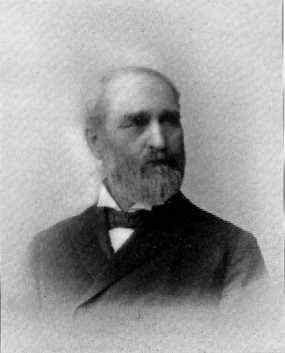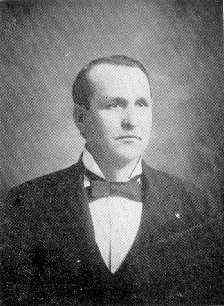
L. CROUNSE.
|
202 |
|
1893-1895.
Governor Lorenzo Crounse delivered his
inaugural January 13, 1893, in which he congratulated the
legislature upon state prosperity, as contrasted with the drouth
of two years before; affirmed the fact of Nebraskans being a
plain, toiling people, averse to "extravagance which begets
extravagance"; and expressed the positive opinion that "the
appropriations made by the last legislature" were $750,000 too
high, and that $50,000 more could be saved by the legislature
dispensing with unnecessary employees; that the management of
state institutions should be so thorough that guilty officials, if
in existence, should be exposed; that "corporations not only have
no right to unjustly take millions, but they should not be allowed
to take an unjust dollar from the people," and yet "their property
deserves the same consideration as that accorded to any other,"
and while the Populist party had control of the legislature and he
would have preferred one in harmony with his own views, still it
was their duty "to advance the welfare and glory of the State in
which we all have such a just pride."
It was at this session of the legislature that
Judge William V. Allen, Populist, was elected United States
Senator for a term of six years.
Two years after the delivery of his inaugural, he was compelled to review a period of great financial depression and failure of crops in the western part of the State, causing him to revive the relief commission of 1891, and giving an opportunity of thanking the people of Oregon and others for substantial aid and the railroads for free transportation for donated supplies: Said he: "My idea is that the several counties should care for their own needy." He believed this would produce economy and

L. CROUNSE.
|
|
203 |
honesty in distribution, and if the State would invest the
permanent school fund in relief bonds of counties, it would be
safer and cheaper than outright appropriations; besides the State
indebtedness had reached the constitutional limit.
He declared the State's financial condition
had, inasmuch as there were outstanding warrants of two classes,
equal to $608,538, with only $28,503 with which to pay. He found
the property of the State $1,275,685,514, assessed at less than 15
per cent of its value. He demanded better security for State funds
deposited with banks; and gave ample evidence of a painstaking and
intelligent care over the investments of the permanent. school
fund. By securing obedience to the law requiring officers of state
institutions to make semi-annual reports of receipts and
disbursements, he was able to see order evolved from confusion and
economy made the rule rather than the exception. While the monthly
demand for coal at the Lincoln Insane Hospital under Thayer's
administration for two terms was 546 tons, and under Boyd's 233
tons for one term, it was only 181 tons during the term of Mr.
Crounse.
It was his good fortune to have administered his
term on $667,000 less of an appropriation than the allowance for
the previous years.
By allowing an officer of a prominent
institution to retain position irrespective of politics, he
honored the doctrine of promotion for merit, and said in his
message: "Sound legislation should not be avoided for fear of the
loss of some partisan advantage." In cases where malfeasance and
embezzlement were suspected he promptly aided the officers of
justice. In the matter of $236,364 he ordered suit to be brought
upon a retired treasurer's bond. He was able to show a decided
decline in insane hospital expenses in these words:
|
204 |
|
In dealing with his immediate fellow-citizens and the outside world he was equally explicit and fair:
The fact that nearly or quite half of the lands within the State lie west of the line of humidity sufficient to insure an unbroken succession of crops, renders irrigation necessary to protect the people against disaster in unusually dry years. The partial failure from drouth in 1890-92-93, and the almost total failure of 1894, has awakened the people to the necessity of providing for watering the growing crops by artificial means. The soil of western Nebraska, where, to some extent, want now prevails, is as fertile as that of any portion of the United States, and in the years past has yielded abundant harvests in response to the efforts of industrious settlers. Thoroughly impressed with the fact of the
State's adaptation to the cultivation of the sugar beet and of the
value of that great industry, he suggested a bounty where a
specific price had been paid the cultivator of the beet, but which
should stop as soon as the United States government gave the sugar
industry protection. He declared the court decision "disappointing
and unsatisfactory," in admitting the constitutional power to
legislate upon freight rates, and then nullifying the law for want
of adaptability and the financial ability of the railroads, and
suggested an appeal to the court of last resort. During his
administration he had specially received and turned into the state
treasury $36,595.
With a carefully prepared and condensed message,
and in a spirit of kindness he made his official bow.
|
|
205 |
|
206 |
|
Hon. Silas A. Holcomb was born in the State
of Indiana in the year 1858, and is, consequently, 37 years of
age, in this 1895. His early education was obtained in the common
and Normal school before his 17th year, when he assumed the duty
of teacher. During four years of teaching he was preparing for
college; but his plans were seriously deranged on account of the
death of his father in 1878. One year thereafter he arrived in
Hamilton County, Nebraska, with his mother and younger brothers
and sisters. Thoughtful, industrious and persevering, he accepted
the first honorable opening for employment, work upon a farm, for
one year, and in 1880 entered the law office of Thummel &
Platt, at Grand Island, and came to the bar in 1882. In 1883 he
removed to Broken Bow, and in 1891 was elected Judge of the 12th
Judicial District.
Though a populist and allied with the silver
democrats, he was elected Governor in 1894, while the State went
republican by pluralities of from twelve to twenty-five
thousand.
The election of Silas A. Holcomb, of the
Populist party, in 1894, took place during the 40th year of our
congressional representation (the limit of these sketches). He has
been preceded by Burt of South Carolina, Izard of Arkansas,
Richmond of Illinois, and Black of Pennsylvania, all democratic
territorial governors, and Saunders, republican, from Iowa; also
by elected governors of the State, Butler, Furnas, Garber, Nance,
Dawes, Thayer and Crounse, republicans, and Boyd, democrat.
Governor Crounse, his immediate predecessor, had been inaugurated
by a populist legislature, while he was inducted into office by a
republican one. In the great political upheaval of 1894 the
populists lost the legislature and gained the Governor, while the
republicans, losing the Governor, gained the legislature, and
consequently the United States Senator, John M.
|
|
207 |
Thurston. the canvass had been one of exceeding bitterness.
Cleveland democrats had been charged with being allies of Wall
Street bankers, bondholders and brokers; republicans, with being
in the same boat, and pandering to capital by high protective
tariffs; while populists were denounced by both of the old
parties, as the destroyers of state credit, advocates of vagaries
and extremists generally. Silly opponents fancied the inaugural of
Governor Holcomb would give forth sulphur, be lurid in war paint
and intimate scalpels and daggers. Populists, silver democrats and
independent republicans, who had supported him, had no fears of
the result and were delighted with the effort. Exceptional in
taste, pure in style, and admirable in scope, dealing only in
living issues, the production carried its own vindication. Almost
the first subject treated was
|
208 |
|
After dwelling upon the success of irrigation upon small scales, he broached the bold and comprehensive theory of National aid:
The great water ways in the State and on its borders have heretofore in early spring run bankful of water. In the early summer they have joined with the waters of the Mississippi and Ohio, and many seasons have spread devastation over the fertile bottoms of Illinois, Missouri, Kentucky, Tennessee, Arkansas, Mississippi and Louisiana, while the vegetation of a portion of Nebraska was in many places withering and drying for want of water. The government has seen fit to expend millions of dollars in the construction and maintenance of great levees to protect the property and lives of the people residing along the rivers in the South. Would it not conserve a double purpose and be productive of inestimable good to both sections if the government would direct its efforts towards turning the waters of the western tributaries of the Mississippi River into great reservoirs and thence into irrigation ditches for the development of sections of the country which now produce very little?

SILAS A. HOLCOMB.
|
|
209 |
Instead of denouncing railroads per se, or urging government control, he declared:
It is an erroneously conceived idea, and quite prevalent, that the interests of the railways and the people of the State are, inimical. In fact the success of each lies principally in the prosperity of the other.But with temporary relief, and permanent aid for irrigation, with fair and ample facilities for transportation, he urged intelligent economy and the freest exercise of the elective franchise as the great conservator of human freedom:
It is your duty to sacredly guard this right to your fellow electors and to reduce to the absolute minimum any infringement of it. Especially does it seem to me that the employees of the larger corporations should, by wise legislation, have such protecting care thrown about them that they may in the exercise of the right of suffrage act without any fear whatsoever from the displeasure of their employers, whose political convictions may be different from their own.
|
210 |
|
If the legislature and he himself shall be so fortunate as to measure up to his standard of duty, his message two years hence will have joyful acceptance.
Although possessing various political beliefs we as legislators and executive should have but one great object in view--to discharge the duties incumbent upon us in a good businesslike manner for the common good of all. Each of you as a legislator has been elected as the advocate of the principles of some political party, but today you represent all the people of your district. In my capacity I shall earnestly endeavor to be the governor of all the people.
 |
 |
 |